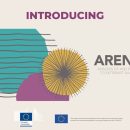This week I have been at the pre-conference workshops for the Learning analytics conference in Edinburgh. This is my presentation at the workshop on Workplace Learning Analytics. And below is the abstract of my paper together with a link to download the full paper, if you should wish. In the next few days, I will write up a reflection on the workshops, plus some new ideas that emerged from talking with participants.
Abstract
The paper is based on early research and practices in developing workplace Learning Analytics for the EU funded EmployID project, focused on identity transformation and continuing professional development in Public Employment Services (PES) in Europe. Workplace learning is mostly informal with little agreement of proxies for learning, driven by demands of work tasks or intrinsic interests of the learner, by self-directed exploration and social exchange that is tightly connected to processes and the places of work. Rather than focusing on formal learning, LA in PES needs to be based on individual and collective social practices and informal learning and facilitation processes rather than formal education. Furthermore, there are considerable concerns and restraints over the use of data in PES including data privacy and issues including power relations and hierarchies.
Following a consultation process about what innovations PES would like to pilot and what best meets their needs, PES defined priorities for competence advancement around the ‘resourceful learner’, self-reflection and self-efficacy as core competences for their professional identity transformation. The paper describes an approach based on Social Learning Analytics linked to the activities of the EmployID project in developing social learning including advanced coaching, reflection, networking and learning support services. SLA focuses on how learners build knowledge together in their cultural and social settings. In the context of online social learning, it takes into account both formal and informal educational environments, including networks and communities. The final section of the paper reports on work in progress to build a series of tools to embed SLA within communities and practices in PES organisations.








